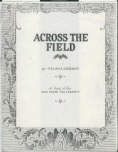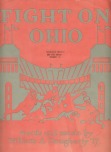 Stanton's receives many calls and emails that begin with “I've got a great piece of music here that's pretty old…†and, sadly, that conversation often ends with “I'm sorry to tell you that piece is permanently out of print.†What does that mean for you, the director/musician when something is permanently out of print (POP)? Read on to find some of the most common questions and their answers:
Stanton's receives many calls and emails that begin with “I've got a great piece of music here that's pretty old…†and, sadly, that conversation often ends with “I'm sorry to tell you that piece is permanently out of print.†What does that mean for you, the director/musician when something is permanently out of print (POP)? Read on to find some of the most common questions and their answers:
1) Why do things go POP?
When we inform someone that a certain piece is POP, the most common response we receive is “I can't believe it—that piece is so good!†While it is true that sometimes a piece is taken out of print due to lack of sales, this is not the only reason. Sometimes there are copyright changes, royalty disputes and other business issues that have nothing to do with sales. Even if a piece is taken out of print due to low sales, that's not necessarily an indicator of quality. A piece that is “good†may also be very difficult, or extremely contemporary or use an unusual voicing/instrumentation, all of which could lead to low sales despite how “good†it is.
2) Why does Stanton's show POP titles on their website?
When Stanton's determines that a piece is no longer in print, we indicate that on our website so that you, the customer, can also have that information. If you were looking for a certain piece and simply didn't see it listed, you may just conclude that it's not available from Stanton's, or that you had typed something incorrectly.
Sometimes a piece that is permanently out of print is not yet listed that way on our website. While we make every effort to keep the information on our website up-to-date, we usually don't learn that a piece has gone POP until we try to order it and the publisher says “sorry, no.†Please call us if you have questions about the status of a particular piece.
3) How do I determine that something is POP?
As stated above, we encourage you to contact Stanton's whenever you have questions about a piece of music. If you are interested in doing some research yourself, you can check the website of the publisher to see if they have more information. If the music is from a publisher that is no longer in business, their copyrights, or “imprints,†are probably still owned by another publisher; the same arrangement may still be in print from the “new†owner of that imprint. You can find more details about defunct publishers on the Music Publishers Association's directory of imprints.
4) Do I have any options for obtaining this music?
Once you have determined that something is POP, you may contact the publisher to request permission to photocopy (Stanton's can give you their contact information) if you have at least one original copy. Especially in the case of churches and schools, the publishers will often grant this request for little or no cost. The publisher will then send you a letter stating that you have permission to make copies. If you do not have an original copy, you might acquire a copy from someone else's library by sending out a query on the ChoralNet listserv, or a similar forum. IT IS ILLEGAL TO MAKE PHOTOCOPIES WITHOUT THE PUBLISHER'S PERMISSION, EVEN WHEN SOMETHING IS NO LONGER IN PRINT!
5) This music is still in print, so why is it so hard for me to get it?!
In addition to “in print†and “out of print,†there are a few other ways to designate the status of a piece of music. It may be “temporarily out of print†(TOP) or “on backorder†(OBO), which means that the publisher is sold out of the music in their warehouse and will need to print some more. It also may be designated as “print on demand†(POD) or an “archive edition,†meaning that it is not something that the publisher keeps in stock, but they will print special copies on request. A piece of music might be a “special import†that is not kept in stock in the US, but that a publisher can get from their international partners. ALL of these situations may affect how long it will take to get your music and how much it will cost.
6) Is there any chance that it WILL come back into print?
No. There may be other arrangements of the same composition available, but once something goes POP, it will not come back.
Permanent means permanent.



 Are you aware that there are a number of online libraries for sheet music in the
Are you aware that there are a number of online libraries for sheet music in the 



